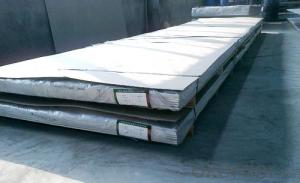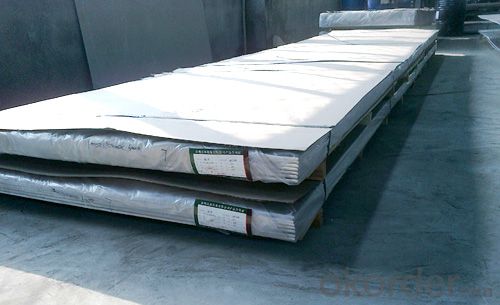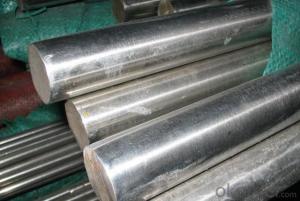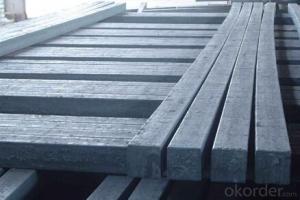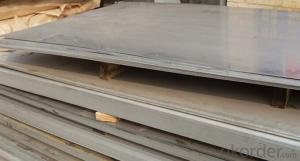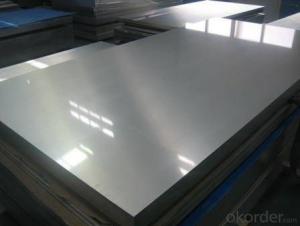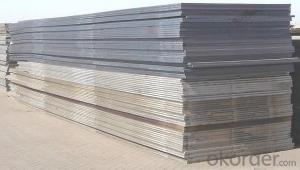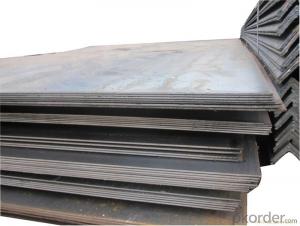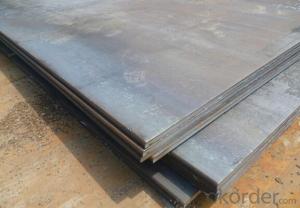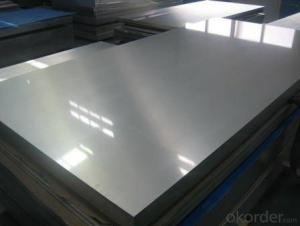Hot Rolled Carbon Steel Sheet_Plate Thickness
- Loading Port:
- Tianjin
- Payment Terms:
- TT OR LC
- Min Order Qty:
- 3 m.t.
- Supply Capability:
- 10000 m.t./month
OKorder Service Pledge
OKorder Financial Service
You Might Also Like
Specification
Hot Rolled Carbon Steel Sheet_Plate Thickness
Thickness:0.6-200mm
Width:1000-4000mm
MOQ: 1 ton
Certificate:ISO,SGS
Hot Rolled Carbon Steel Sheet_Plate Thickness
Commodity | Carbon Steel Hot Rolled Coil_Plate_Strip_Sheet |
Thickness | 0.6-200mm |
Width | 1000-4000mm |
Length | as custom's request |
Technique | Cold rolled or hot rolled mild steel plate |
Surface treatment | Bare, galvanized coated or as customer's requirements. |
Standard | ASTM,EN,GB,JIS |
Material | SS330, SS400, SPHC, SPHD, SPHE, Q195, Q195L, Q235, Q345, 08AL |
Usage | 1. Automobile, Bridges, Buildings,
2. Machinery, Pressure vessel industries.
3. Ship building, Engineering construction,
4. Mechanical manufacturing, Pavement slab, ect.
|
Terms of Payment | 30% T/T as deposit and 70% T/T balance againest B/L copy. |
Delivery Detail | Within 3-15 days after receipt of deposited for the mild steel plate |
CNBM Introduction of Hot Rolled Carbon Steel Sheet_Plate Thickness
CNBM International Corporation is the most import and export platform of CNBM group(China National Building Material Group Corporation) ,which is a state-owned enterprise, ranked in 270th of Fortune Global 500 in 2015.
With its advantages, CNBM International are mainly concentrate on Cement, Glass, Iron and Steel, Ceramics industries and devotes herself for supplying high quality series of refractories as well as technical consultancies and logistics solution.
After-sale service |
|
Advantages
|
|
Packaging & Delivery of Hot Rolled Carbon Steel Sheet_Plate Thickness
Packaging Detail | Sea worthy packing /as per customer's packing instruction |
Delivery Detail | 15 ~ 40 days after receiving the deposit |
Products
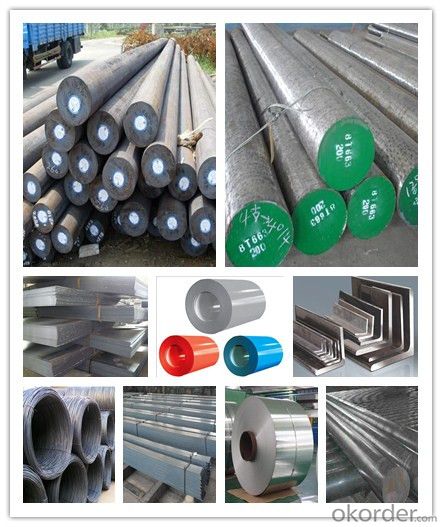
FAQ:
Are you a trading company or manufacturer? | Manufacturer |
What’s the MOQ? | 3 metric ton |
What’s your delivery time? | 15-35 days after downpayment received |
Do you Accept OEM service? | Yes |
what’s your delivery terms? | FOB/CFR/CIF |
What's the Payment Terms? | 30% as deposit,70% before shipment by T/T |
Western Union acceptable for small amount. | |
L/C acceptable for large amount. | |
Scrow ,Paybal,Alipay are also ok | |
Why choose us? | Chose happens because of quality, then price, We can give you both. Additionally, we can also offer professional products inquiry, products knowledge train (for agents), smooth goods delivery, excellent customer solution proposals. |
What's your available port of Shipment? | Main Port, China |
What’s your featured services? | Our service formula: good quality+ good price+ good service=customer's trust
|
Where are your Market? | Covering more than 160 countries in the world |
- Q: How does special steel perform in oil and gas applications?
- Special steel is highly desirable and widely used in oil and gas applications due to its exceptional performance and superior properties. Special steel exhibits excellent resistance to corrosion, which is crucial in environments where oil and gas are present. This resistance to corrosion helps prevent equipment failure and ensures the longevity and reliability of the components. Moreover, special steel possesses high strength and durability, making it suitable for withstanding extreme conditions, such as high pressure and temperature. This strength allows the steel to withstand the demanding and harsh environments that oil and gas applications often present. Additionally, special steel can retain its mechanical properties even at elevated temperatures, providing stability and reliability in these challenging conditions. Another significant advantage of special steel is its excellent weldability. This property allows for easy fabrication and assembly of components, reducing production time and costs. It also ensures the integrity of the structures and equipment used in oil and gas applications. Furthermore, special steel offers exceptional resistance to fatigue and wear, which are common concerns in oil and gas operations. The ability of special steel to withstand cyclic loading and abrasive conditions ensures the longevity and reliability of the components, reducing maintenance and replacement costs. Overall, special steel performs exceptionally well in oil and gas applications due to its corrosion resistance, high strength, durability, weldability, and resistance to fatigue and wear. Its superior properties make it a preferred choice for critical components, ensuring the efficiency, safety, and reliability of oil and gas operations.
- Q: What is the life cycle of special steel products?
- The life cycle of special steel products typically involves several stages, starting with the extraction and processing of raw materials to create the steel. This is followed by the manufacturing and fabrication processes, where the steel is shaped and formed into the desired product. Once the product is ready, it is typically distributed to customers and used in various applications, such as construction, automotive, or aerospace industries. During its use, the special steel product may undergo regular maintenance, repairs, or modifications to ensure optimal performance. Finally, at the end of its life cycle, the steel product may be recycled or disposed of responsibly, contributing to a more sustainable approach in the industry.
- Q: How does special steel perform under high-temperature conditions?
- Special steel is specifically engineered to excel in high-temperature scenarios, showcasing impressive resistance against thermal expansion, oxidation, and creep. This enables the steel to uphold its structural integrity and mechanical properties when exposed to elevated temperatures. The exceptional performance of special steel can be attributed to its distinctive composition, often consisting of elements like chromium, nickel, and molybdenum. These alloying components create a protective oxide layer called passivation on the steel's surface, acting as a barrier against corrosion and further enhancing its ability to withstand high temperatures. Moreover, the microstructure of special steel is meticulously regulated through various heat treatment processes, including quenching and tempering, to attain optimal toughness and strength even in elevated temperature conditions. Consequently, special steel offers outstanding reliability and performance in high-temperature environments, making it the preferred choice for applications in power generation, aerospace, and petrochemical industries.
- Q: What are the requirements for special steel used in electronic components?
- The requirements for special steel used in electronic components include high electrical conductivity, excellent corrosion resistance, good magnetic properties, and the ability to withstand high temperatures. Additionally, the steel should have low impurity levels to prevent any interference with electronic signals and should also possess high strength and durability to ensure long-term performance and reliability of the components.
- Q: What are the different surface finishing techniques used for special steel?
- Some of the different surface finishing techniques used for special steel include electroplating, hot-dip galvanizing, powder coating, and passivation.
- Q: How does special steel contribute to the renewable energy aftermarket industry?
- Special steel plays a crucial role in the renewable energy aftermarket industry by enhancing the efficiency, durability, and cost-effectiveness of renewable energy systems. One of the primary applications of special steel in this industry is in the manufacturing of wind turbine components. Wind turbines require high-strength and corrosion-resistant materials to withstand the harsh environmental conditions and generate electricity efficiently. Special steel alloys, such as high-strength low-alloy (HSLA) steel and stainless steel, offer superior mechanical properties, fatigue resistance, and excellent corrosion resistance, making them ideal for wind turbine tower structures, rotor blades, and other critical components. By using special steel in wind turbine manufacturing, the renewable energy aftermarket industry can benefit from increased turbine lifespan, reduced maintenance costs, and improved energy output. The strength and durability of special steel enable taller and larger wind turbine towers, allowing for the installation of turbines in areas with lower wind speeds. This expansion of suitable locations helps to maximize the energy production potential, making wind energy a more viable and widespread renewable energy source. Furthermore, special steel also contributes to the renewable energy aftermarket industry through its application in solar power systems. Solar panels require robust mounting structures to support the weight of the panels, withstand wind and snow loads, and ensure optimal sun exposure. Special steel, with its high strength-to-weight ratio and corrosion resistance, is commonly used in these mounting structures, providing long-lasting and reliable support for solar panels. In addition to wind and solar energy, special steel finds applications in other renewable energy systems such as hydroelectric power plants and geothermal systems. These industries benefit from the corrosion resistance and resistance to extreme temperatures offered by special steel, ensuring the longevity and efficiency of the equipment. Overall, special steel significantly contributes to the renewable energy aftermarket industry by enabling the production of reliable, durable, and efficient renewable energy systems. Through its use in wind turbines, solar panels, and other renewable energy technologies, special steel helps to enhance the performance and longevity of these systems, ultimately driving the growth and adoption of renewable energy sources worldwide.
- Q: What are the factors that can affect the machinability of special steel?
- There are several factors that can affect the machinability of special steel. One of the main factors is the composition of the steel. The presence of certain elements such as carbon, chromium, and nickel can greatly influence the machinability. For example, high carbon content can result in increased hardness and brittleness, making the steel more difficult to machine. On the other hand, the addition of elements like sulfur and lead can improve machinability by enhancing chip formation and reducing friction. The heat treatment of the steel also plays a significant role in machinability. Different heat treatments, such as annealing or quenching, can alter the microstructure of the steel, affecting its hardness and toughness. Heat-treated steels may be more difficult to machine due to their increased hardness or the presence of residual stresses. The mechanical properties of special steel, such as hardness and tensile strength, can also impact machinability. Harder steels require more cutting force and may result in increased tool wear or vibration during machining. Similarly, steels with high tensile strength may pose challenges in terms of chip formation and tool life. The cutting conditions and machining parameters used also affect machinability. Factors such as cutting speed, feed rate, and depth of cut can significantly impact the process. High cutting speeds can result in increased temperatures and tool wear, while low cutting speeds may lead to poor surface finish. Additionally, the choice of cutting tools, their geometry, and their coatings can also influence the machinability of special steel. Finally, the presence of impurities or contaminants in the steel, such as non-metallic inclusions or surface defects, can negatively affect machinability. These impurities can cause tool wear, poor surface finish, or even tool breakage. Therefore, the quality and cleanliness of the steel are crucial for achieving good machinability. In summary, the factors that can affect the machinability of special steel include its composition, heat treatment, mechanical properties, cutting conditions, and the presence of impurities. Understanding and optimizing these factors can help improve the machinability and overall performance of special steel during machining operations.
- Q: How does special steel perform in high-temperature oxidation?
- Special steel performs well in high-temperature oxidation due to its enhanced resistance to heat and corrosion. It exhibits superior strength and stability, retaining its mechanical properties even at elevated temperatures. Additionally, the presence of alloying elements like chromium, nickel, and molybdenum in special steel forms a protective oxide layer that prevents further oxidation. This makes special steel an ideal choice for applications requiring resistance to high-temperature oxidation, such as in aerospace, power generation, and chemical industries.
- Q: Can special steel be used in the production of consumer goods?
- Yes, special steel can be used in the production of consumer goods. Special steel offers enhanced properties such as high strength, durability, corrosion resistance, and heat resistance, making it suitable for various consumer goods applications. It can be utilized in the manufacturing of kitchen utensils, cutlery, appliances, automotive parts, tools, and more, ensuring improved performance and longevity of these products.
- Q: What are the different methods for improving the heat resistance of special steel?
- There are several methods for improving the heat resistance of special steel. One common approach is alloying, where additional elements are added to the steel composition to enhance its resistance to heat. Another method is heat treatment, which involves subjecting the steel to specific heating and cooling processes to alter its microstructure and improve its ability to withstand high temperatures. Additionally, surface treatments such as nitriding or coating can be used to enhance the heat resistance of special steel by forming a protective layer on its surface.
Send your message to us
Hot Rolled Carbon Steel Sheet_Plate Thickness
- Loading Port:
- Tianjin
- Payment Terms:
- TT OR LC
- Min Order Qty:
- 3 m.t.
- Supply Capability:
- 10000 m.t./month
OKorder Service Pledge
OKorder Financial Service
Similar products
Hot products
Hot Searches
Related keywords
